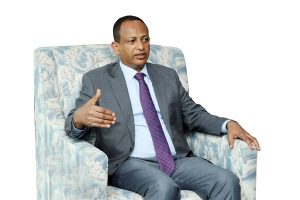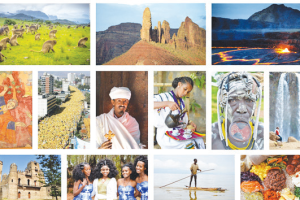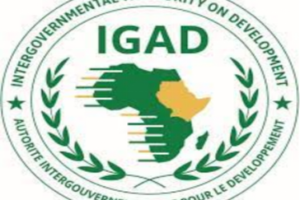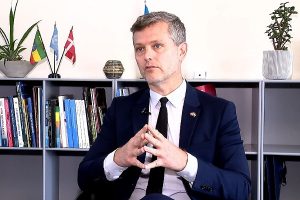
The Middle East Monitor, an online news portal this week wrote that Ethiopia escalates what it called the Renaissance Dam crisis with decision not to notify Sudan and Egypt about start of dam’s filling. “The Ethiopia acting foreign affairs spokesman announced that the country’s plan to start filling the Ethiopian Renaissance Dam in the upcoming wet season is part of the scheduled construction, and there is therefore no need to notify Sudan and Egypt.”
There is little doubt that Middle East Monitor’s slanted reporting on the GERD is written in a way favorable to Egypt’s standing on the dispute.
The online news portal also quoted acting foreign affairs spokesman Amsalu Tizazu saying the letter Egypt recently sent to the UN Security Council about the dam controversy was irrelevant because the filling of the dam is a logical step in the construction of the dam which at a certain stage requires the filling process to start according to schedule.
The Ethiopian government has put forward two main agendas that it will work hard to implement during the remaining part of its mandate. The first is the fight against the COVID-19 pandemic while the second is the continuation of work on the Great Ethiopia Renaissance Dam (GERD) until the time the filling of the dam will start early next Ethiopia year. According to recent statements from the Prime Minister’s office, the GERD is Ethiopia’s flagship project that no force can reverse or put an end to before its completion. This reassertion or expression of strong resolve on the part of the government is also received with equal determination and enthusiasm from the general public.
There is no disagreement among all political forces in the country as to the need to complete the GERD project no matter what time and effort it might take. On the contrary, there is now a patriotic fervor regarding the GERD project. All Ethiopians in every walk of life are still rallying behind the government’s call to close ranks and heighten vigilance in the ongoing construction of the project. By the same token, all parties agree on the need to fight the pandemic with equal determination because it has direct and indirect repercussions on the country’s political, economic and social development projects. Judging from recent events and developments, we can say that there is a strong national consensus on the continuation of the GERD project despite the odds.
Unfortunately, the GERD has never been free from controversies since its inception down to this day. It has passed moments of frustration and even threats of disruption by internal and external forces hostile to Ethiopia’s greatest construction project. At one moment, mismanagement and corruption threatened the project with disruption. At another time, the hostility came from foreign sources intent on stopping the project in its infancy.
However, the greatest challenge came from those quarters directly concerned with the very idea of building a mighty dam on one of the greatest rivers in Africa if not in the world. These are forces that tried to roll the wheels of history backwards or infringe upon Ethiopia’s inalienable right to use its natural resources to promote the welfare of its own people.
Since its inception nine years ago, the GERD project has passed through many ups and downs, diplomatic twists and turns as well as moments of much foot-dragging in negotiations. These were followed by accusations and counter-accusations and much war of words until the matter assumed a diplomatic shape and entered a period of principled debates among the disputing parties. As we all remember, Egypt, Ethiopia and Sudan were, and still are, the main players in this diplomatic tagof-war. However, out of the three parties to the dispute, only Egypt proved inconsistent and sometimes aggressive in its bid to get the upper hand on the diplomatic front and nip in the bud Ethiopia’s quest for economic development by resorting to soft and hard tactics of intimidation and threats as well as other tricks.
On the other hand, Ethiopian diplomacy on the GERD is not only consistent with international principles. It is also pragmatic, flexible and all-inclusive in the sense that it is intended to benefit all the stakeholders no matter what their contribution to the waters of the Nile river is. A good example of Ethiopia’s diplomatic pragmatism may be its willingness to attend the Washington talks on the Nile on the invitation of the US administration because Addis Ababa has always been open and transparent as well as ready to hear all voices irrespectively where they come from.
Ethiopia’s diplomatic patience is also remarkable. While it is clear that Ethiopia has a legitimate request on the use of the Nile waters, it did not try to impose its views in any way or treat the other parties as junior partners in the talks. Ethiopia has consistently pursued a diplomatic line that is based on finding a win-win solution for every party involved in the talks. Ethiopia never tried to win extra advantage from the talks simply because it is the main source of the Nile waters. Instead, it regards all parties to the talks as equal partners and this has found practical expression during the preparation and the execution of the GERD project that has taken the interests of other riparian countries into consideration.
Egypt does not contribute a drop of water to the Nile but it has been benefitting the most from it throughout its history. Ethiopia is contributing more than 80 percent of the waters of the Nile but it has not so far used a drop from the mighty river to promote its economic development. Egypt is one of the leading economic powers in north Africa while Ethiopia is one of the least developed countries in Africa with the twin threats of famine and drought hanging over its head for centuries. This is why Egypt’s opposition to Ethiopia’s project looks ridiculous if not puzzling.
By comparison, Egyptian diplomacy on the Nile has been meandering along an uncertain and tortuous course since the Nile dispute started when Ethiopia decided to exercise its legitimate right on the Nile waters. By comparison, Egyptian diplomacy is marked by rigidity and lack of solid and honest principles that could guide it along a more realistic and more just course that would take into consideration the interests and aspirations of all the Nile riparian states. The rigidity of Egyptian diplomacy on the Nile is anchored in the colonial time agreement the British imposed on the country. Egypt as a sovereign state is still embracing and promoting this imperialistinspired agreement instead of rejecting it and joining its African neighbors and work for collective development. In this way, Egyptian diplomacy on the Nile waters in general and on Ethiopia’s quest for economic development is not only archaic but also dysfunctional.
As early a few months back, Egyptian diplomacy brought the dispute out of its African context and sought to secure the assistance of extra-regional forces in order to promote its colonial era interests. The United States was the last card Egypt tried to play in its bid to find a superpower that would impose Egyptian interests on Ethiopia in order to stop the construction of the GERD project or modify it in a way that would serve Egypt more than it serves Ethiopia.
The global COVID-19 pandemic has upset so many things in the world. It has also upset Egypt’s plan to use the might and weight of the US in order to force Ethiopia accept the Egyptian terms of the Nile agreement.
True, the US is a major ally of Ethiopia and the biggest aid provider. But it would be unrealistic to expect Washington to serve as a Trojan Horse to promote Egypt’s policy or any other country’s interests in Africa or in the context of the Nile dispute.
As many analysts and GERD-watchers pointed out several times in the past, the basic thinking behind Egypt seeking US diplomatic intervention was presumably to use Washington as leverage or as a conduit for Egyptian policy on the Nile and push Ethiopia into accepting Egyptian position in the dispute. However, this could not be realized as expected following the global outbreak of the corona virus that has hit the US hardest and pushed its mediation efforts to the back burner. Egypt is impatient to wait until the global health crisis subsides so that the US could consummate its mediation efforts. Instead, it has chosen to look for another alternative in its search for other partners in its bid to disrupt Ethiopia’s project.
Since then, Egypt has made efforts to bring the issue to international mediation by subtly portraying itself as the victim of Ethiopia’s premeditated plan to deny Egypt of its absolute control of the Nile waters as in the days of British colonialism. Previously, there were threats from the Egyptian side to bring the matter to consideration by international bodies instead of calling on African or continental bodies such as the African Union or one of its agencies to intervene and seek a fair, impartial and realistic solution to the dispute. Looking for an African solution to an African challenge has never been Egypt’s choice. Instead of that, Egypt sought Arab League solidarity in its bid to put pressure on or frustrate Ethiopia’s honest, transparent and all-inclusive attitude in the Nile negotiations.
The latest Egyptian diplomatic step and the letter written to the UN Security Council cannot change the reality on the ground because construction on the dam has already gone a long day and reached an irreversible stage. It has not budged Ethiopia that has always remained true to its original principles and actions on the GERD project. Ethiopia is continuing work on the GERD while Egypt is leaving no stone unturned to sabotage it through third parties as it did in the case of US mediation efforts.
So Ethiopia is carrying out the twin tasks not only as a matter of emergency and commitment. They are also inescapable national tasks that this generation of Ethiopians is committed to achieve come what may. What is amazing is that the GERD project has recently reached 70% completion level despite the many diplomatic zigzags, advances and setbacks of the last nine years. The Filling of the dam is expected to start early next Ethiopian year and that will mark another milestone in the history of the construction of the biggest hydroelectric project in Africa if not in the world. No force can stop this inexorable process but constructive diplomacy can turn the tide in favor of the three main parties to the Nile dispute.
BY MULUGETA GUDETA
The Ethiopian Herald Sunday Edition 24/2020





